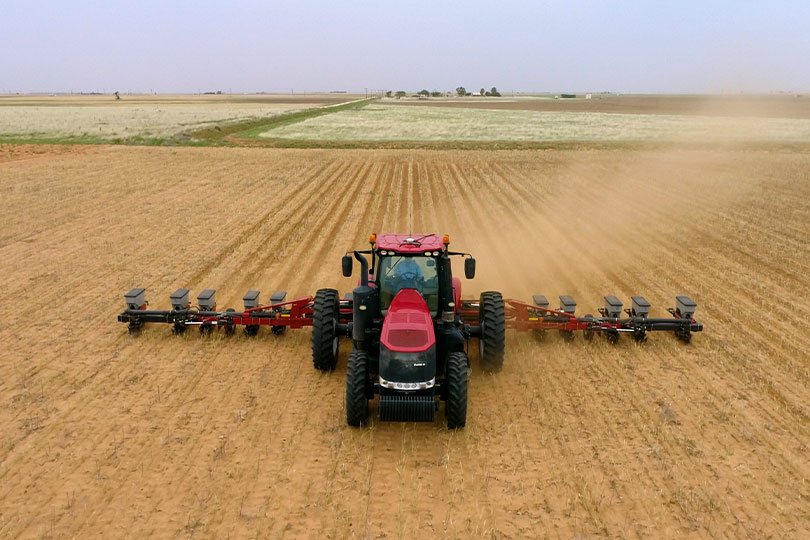By Jessica Domel
Multimedia Reporter
In one of the last acts of the 118th Congress, lawmakers passed a continuing resolution (CR) to fund the government that includes a one-year extension of the 2018 Farm Bill, aid for those impacted by natural disasters and economic assistance for farmers.
After Congress passed the American Relief Act, agricultural groups like Texas Farm Bureau (TFB) and the American Farm Bureau Federation (AFBF) thanked lawmakers for approving the critical provisions for farmers and ranchers.
“A large segment of Texas agriculture was facing catastrophic consequences if Congress did not act on this must-pass legislation,” TFB President Russell Boening said in a statement. “TFB greatly appreciates the many members of the Texas congressional delegation who supported Texas farm and ranch families by voting for the continuing resolution.”
The CR funds the government through March 14.
It allocates $30.78 billion to the Secretary of Agriculture to be disseminated for expenses related to the loss of revenue, quality or production of crops due to droughts, wildfires, hurricanes and other natural disasters for calendar years 2023 and 2024.
Of that funding, the CR allocated up to $2 billion to provide assistance to livestock producers for losses in 2023 and 2024 due to drought, wildfires and floods.
It also includes $10 billion in the form of economic assistance for farmers.
“Farm Bureau thanks the House and Senate for finding common ground and passing legislation that will keep the government open and help farmers who are struggling with natural disasters, high supply costs and out-of-reach interest rates,” AFBF President Zippy Duvall said. “For many farmers, the disaster relief provided through the CR will be the difference between planting for another year or going out of business.”
The CR also allows the Secretary of Agriculture to provide assistance, via block grants, to compensate farmers who suffered losses as a result of Mexico’s failure to deliver water to the United States as outlined in the 1944 Water Treaty.
“South Texas farmers have endured immense hardships due to Mexico’s continued violations of the 1944 Water Treaty,” Congresswoman Monica De La Cruz (R-TX) said. “Securing and maintaining these block grants was a top priority because our agricultural producers urgently need this support to recover and rebuild. This victory ensures they have the resources to overcome the challenges caused by Mexico’s treaty violations and continue to thrive. This helps our local farmers and is a win for Texas and the entire nation.”
The CR Congress passed did not include a provision allowing year-round E15 sales nationwide. It was included in a draft of the CR that was considered earlier in the week that failed.
“It’s unfortunate that the final measure did not include authorization for year-round E-15 sales, which benefits farmers, leads to lower fuel prices and helps America reach its sustainability goals. We will continue to push for this in 2025,” Duvall said.
The resolution allows the Secretary of Agriculture to use up to $30 million for imbursements for administrative and operating expenses available for crop insurance contracts for 2022 and 2024 reinsurance years.
The CR extends the 2018 Farm Bill, which expired Sept. 30, by another year.
Thompson, who will continue to serve as chair of the House Ag Committee in 2025, indicated he hopes to take up the farm bill in the first quarter of the new year.
“The economic and disaster assistance in the CR is a temporary fix to long-term challenges facing America’s farmers. The farm bill extension also offers a short reprieve, and gives lawmakers some breathing room to pass a modernized farm bill that will provide risk management support,” Duvall said. “We urge them to build on the bipartisan efforts demonstrated during the CR to pass a new five-year farm bill that delivers certainty for rural America and ensures a stable food supply for the nation.”
Prior to the vote, AFBF and TFB representatives were in Washington, D.C. meeting with lawmakers to stress the need for economic assistance for agriculture as farmers enter the third year of crop losses.
According to AFBF, since crop prices peaked in 2022, corn and wheat prices are down 37%, soybeans are down 28% and cotton has fallen 22%.
At the same time, input costs have remained high.
AFBF reports compared to 2020, the cost to produce an acre of corn has grown nearly 30% nationally.
The grassroots farm organizations also discussed the outdated and ineffective farm safety net with lawmakers, telling them that the mechanisms that make the safety net programs work have not kept up with input prices.
And with net farm income down, they said economic assistance is needed to ensure farmers can get from this crop to the next.
“For some, it will quite literally make the difference between going under and holding on through another planting season,” Duvall said.
The CR passed the U.S. House Friday in a 366-34-1 vote.
The Senate passed the resolution shortly after 11:40 p.m. Central in an 85-11 vote.
The president signed the CR Saturday, Dec. 21.


Leave A Comment